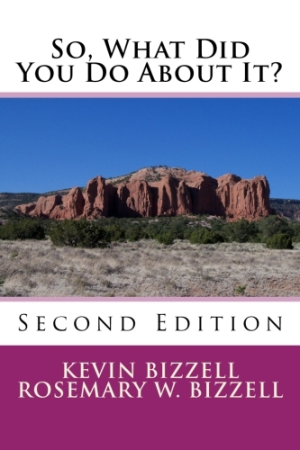So, What Did You Do About It?
A victim of traumatic brain injury details his journey to spiritual recovery.
Kevin Bizzell suffered a traumatic brain injury (TBI) in 1995 at the age of thirty-two, and he says he had a profound out-of-body experience during the several days he spent in a coma. His lengthy and successful recovery from the TBI, combined with the life-altering effects of his quest to find meaning in the injury and his coma experience, compelled him to write So, What Did You Do About It? The book pulls together a host of themes, from an exposé of the Catholic Church to several prevalent conspiracy theories, where they are woven into a personal and global manifesto.
Rosemary Bizzell, Kevin’s mother, opens the first few chapters with her detailed recollection of Kevin’s accident and his recovery. Much of what she has written is on the minutiae of her life, though close relatives of those with a TBI might find solace in her intimate and fairly well-written account of life as a parent and caretaker to a grown son with a brain injury.
The first half of So, What Did You Do About It? focuses on Bizzell’s recovery and reintegration into his life as a teacher. He writes well about his agonizing struggles with the physical and emotional side effects of his injury and his medications, as well as his interactions with the medical establishment in particular, and society in general. He tells of his move from the Midwest to take a teaching job in New Mexico, where he encounters the complexity of teaching Native American youth and immerses himself in Navajo culture. His insightful and compassionate telling of life in the Navajo Southwest as a math teacher with a TBI is entertaining and eye-opening.
Bizzell’s immersion in Ayurveda leads him to become the disciple of a Hindu teacher, Anandi Ma, and he writes with sincerity, passion, and skill about Hinduism and the guru-disciple relationship.
The central theme of So, What Did You Do About It? is Bizzell’s search to find a logical, unifying meaning behind war, religion, suffering, the cosmos, and why he got a TBI. His extensive research into The Urantia Book, the teachings of David Icke and other controversial authors, 9/11 conspiracy theories, and the Illuminati, coupled with his countless Internet investigations, is impressive. Conventional thinkers may roll their eyes, but those who have an interest in this very popular niche world of fear-feeding lizard-human hybrids from our galaxy might find Bizzell’s ideas and conclusions brilliant.
Bizzell tends to share, in too much detail, his financial situation, his experiences searching for a car and sound equipment, his health issues, and his travel itineraries. There are some errors in the text, such as misspelled words like “crones” for “Crohn’s” and “desert” for “dessert.”
The ending is somewhat disjointed, but this is understandable; Bizzell explains that he was overwhelmed trying to pull it all together into a cohesive finale. He writes that his hope is to start an Internet conversation with other like-minded individuals. If his book is marketed to the right audience, it could sell well.
Reviewed by
Patty Sutherland
Disclosure: This article is not an endorsement, but a review. The publisher of this book provided free copies of the book and paid a small fee to have their book reviewed by a professional reviewer. Foreword Reviews and Clarion Reviews make no guarantee that the publisher will receive a positive review. Foreword Magazine, Inc. is disclosing this in accordance with the Federal Trade Commission’s 16 CFR, Part 255.

